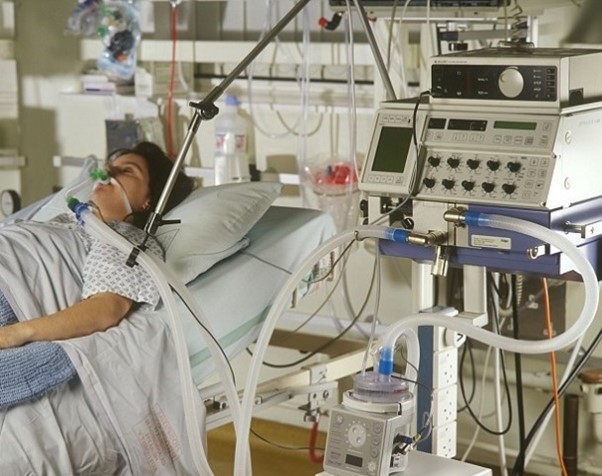Hi, it’s Patrik Hutzel from INTENSIVECAREHOTLINE.COM where we instantly improve the lives for Families of critically ill Patients in Intensive Care, so that you can make informed decisions, have PEACE OF MIND, real power, real control and so that you can influence decision making fast, even if you’re not a doctor or a nurse in Intensive Care!
This is another episode of “YOUR QUESTIONS ANSWERED” and in last week’s episode I answered another question from our readers and the question was
How Can I Gain Control Over the ICU Team in Making Decisions for My Mom’s Care & Treatment in ICU?
You can check out last week’s question by clicking on the link here.
In this week’s episode of “YOUR QUESTIONS ANSWERED” I want to answer questions from one of my clients, Isabel as part of my 1:1 consulting and advocacy service! Isabel’s mom is in ICU on a ventilator with pneumonia and she is asking when will her mom wake up in ICU after being in an induced coma.
When Will My Mom in ICU Wake Up After Being in an Induced Coma?

Patrik: Hi Isabel! Can you tell me what happened to your mom?
Isabel: Okay, Patrik, our mom is in the ICU. She went in for COVID pneumonia. I found your video, I think one of the most recent YouTube videos that you have is about the patient where the mother hasn’t woken up. And it’s almost very, very similar to the situation where my mom had the UTI (Urinary Tract Infection), COVID, pneumonia, and kidney dialysis. They’ve recently taken her off the sedation, I think it’s been 48 hours now, hasn’t responded. That’s where we’re at right now, Leon?
Leon: Huh? You said what?
Isabel: Is that kind of where we’re at right now?
Leon: No, well, remember that they put her back on the sedation because she just wasn’t having a good day, so they started the conventional dialysis, because she was on the slow dialysis that runs 24 hours, and then started the conventional dialysis. So I guess her body did not like that and she was just out of whack. I don’t know if it was during the dialysis or even before that her heart rate was getting elevated, and her blood oxygen was just dipping into the 80s, and then it would go to the 90s, and it would go to the 80s, and 90s. And so they put her back on the sedation medicine, they put her back on the blood pressure medicine to keep it up. Then they increased her blood pressure to 100 at 90%, increased it back to 100, and she’s on nitric oxide. And they also put a paralyzer because supposedly her lung, I hope I’m not twisting what they said, but that she was going against the ventilator.
So right now, the current situation is that my mom’s heart rate is elevated and her oxygen was dipping into the 70s, from what the nurse told me, probably an hour ago. We had just left the hospital, my dad and I had just left the hospital. She was around 84, 85. So that’s the current situation with my mom at the moment.
Patrik: And this is for COVID pneumonia?
Leon: Yes.
Isabel: COVID pneumonia, correct.
RECOMMENDED:
Leon: And has ARDS (Acute Respiratory Distress Syndrome). She has the fibrosis in her lungs.
Patrik: She has fibrosis, okay. How many days in ICU?
Leon: ICU? A little over a week. Sorry, not a week. Two weeks and a day.
Patrik: Right. And when did they first start-
Isabel: 11 days.
Patrik: 11 days. When did they first start to talk about fibrosis and ARDS?
Leon: Probably the day that she got intubated.
Patrik: Okay. And prior to intubation, how long was she in hospital and what did they do prior to intubation?
Isabel: Probably about, is it three weeks?
Patrik: Three weeks?
Isabel: Yeah, I believe so. She was on a high-flow oxygen originally, of course, she was just recovering. I think it took her about a week. Vitals taken a week, she was already talking, very alive, just ready to go home. They took her down to a CT (Computed Tomography) scan, and I guess they couldn’t take the high-flow oxygen. They put her on a lower oxygen, and that’s when everything just went downhill. Then it went down to the 70s and she wasn’t able to recover, so they were just rushing to put in an intubation because she would possibly go into cardiac arrest.
Patrik: I see. That’s when she ended up intubated?
Isabel: That’s when she ended up intubated, yeah.
Patrik: Right, okay. Right. How old is your mom?
Isabel: 76.
Patrik: 76. Any pre-medical condition? Or any significant-
Leon: She has mild asthma, but it’s something that she wasn’t born with. It’s something that she believes she got from the chemicals that she used to work with. Because she used to work in maintenance. And then she’s pre-diabetic. I believe she has mild fatty liver and I think high blood pressure. I think that’s what it was.
Patrik: Okay, okay.
Leon: But everything was on the mild level, it wasn’t anything crazy.
Isabel: She would never have an asthma attack but they prescribed her a nebulizer, or she’d have the medicine that she would use the nebulizer with.
Patrik: Yeah, probably Ventolin nebulizer. But before COVID, you would argue, for 73 years of age she was fit and healthy?
Leon: Oh, very.
Isabel: Yeah, yeah. My mom was used to be climbing mountains just last year, so yeah. Completely fine.
Patrik: Okay, yes. Okay, excellent, excellent. Okay. Do you think there’s anything else that’s relevant to her situation? I’ve just taken some notes. Do you think there’s anything else that’s… Is she still on paralysis?
Leon: Yeah. Today they put her back on the paralytics.
Patrik: On the paralytics.
Isabel: So, they gave her cold turkey after sedation, about 40, maybe running close to 72 hours now. I think it was 48 hours at 8:00 this morning here, so we’re past 48 hours on the sedation and they just cut her off cold turkey. And they can’t give her a CT scan because she’s connected to the nitric oxide, from what I understood. Is that right, Leon?
Leon: Mm-hmm.
Suggested Links:
- YOU DON’T KNOW WHAT YOU DON’T KNOW WHEN YOUR LOVED ONE IS CRITICALLY ILL IN INTENSIVE CARE! (PART 1)
- YOU DON’T KNOW WHAT YOU DON’T KNOW WHEN YOUR LOVED ONE IS CRITICALLY ILL IN INTENSIVE CARE! (PART 2)
Patrik: She’s connected to what?
Isabel: So we don’t know. The nitric oxide, they can’t get her down to CT-
Patrik: Oh, nitric oxide, yeah. Okay, yeah, yeah, yeah. Okay, sure.
Isabel: Yeah. So, they don’t know what’s going on with her brain, is there something wrong, maybe pressure? So, they’re just kind of playing the guessing game, and then now they’re just already telling us, “Hey, your mom’s going to be in a very serious state, and we’re going to cut her off and move on.”
Patrik: Okay. Why are they worried-
Leon: And they said that she could… Go ahead.
Patrik: Why are they worried about her brain?
Leon: Because they have said that they opened her eyes and they see what they call dolls eyes, she has the dolls eyes. And, one, because she hasn’t responded, and the doctor said that usually with the sedation that it’s fast-acting and it should drain out of the body quickly, and that usually, patients will start gagging and coughing. And she hasn’t shown anything with any stimulation.
Patrik: I see. And when did she say that? When did you have that conversation?
Leon: It was yesterday.
Patrik: Yesterday, okay. And how long was she off sedation before she said that to the doctor?
Isabel: 24 hours. Yeah, 24 hours when we had the conversation.
Patrik: Okay, okay, all right. What would you-
Isabel: So she’s-
Patrik: Go on, go on.
Isabel: Oh, she is now currently in the second hospital. So, the first hospital, where she got intubated in, she was having issues with the heart rate, they just kept on pumping more and more sedation into her body to lower the heart rate. And I’m assuming, maybe, probably antibiotics and that going down, his kidneys started failing. They don’t do kidney dialysis at that hospital so they transferred him to the nearest hospital, just a minute away. So, she’s been there now for how long, Leon?
Leon: She’s been there since Saturday.
Isabel: Saturday. And then they started the kidney dialysis the day after she arrived.
Patrik: Right, okay. Have they proned her?
Leon: They have tried to prone her, but she doesn’t really do well. Her oxygen saturation level goes down when she gets proned.
Patrik: Okay, so proning has more or less failed.
Leon: Yes.
Patrik: Okay. As of right now, her oxygen levels are 90 to 100% on the ventilator, is that what you’re saying?
Leon: Yes.
Patrik: Right, okay. Do you know what I mean when I say has she had an arterial blood gas? Do you know what I mean by that?
Leon: Yeah, the ABG, yes.
Patrik: Yeah. Did she have an ABG and do you have any numbers?
Leon: Not any recent ones, honestly.
Patrik: That’s okay.
Leon: I do know just right off the bat, her pH, she was having acidosis. Her pH was neutralizing, the last number I know it was 7.31. That was maybe yesterday or two days ago. Her kidneys were going in the direction, the right direction, to start bettering. And as far as actual oxygen levels and carbon dioxide, that I do not know.
Patrik: That’s okay. That’s okay. As of right now, what would you consider your or your mom’s biggest challenge?
Leon: I would say it’s the lungs because of the stiffness and the fibrosis that is going on, and I guess the fact that she’s not responding. I don’t know if it’s a neurological issue, that’s the concern.
Patrik: Yeah, yeah, sure. No, I hear you. So basically in the last 48 hours, just for me to summarize that and so that I’m on the same page with you, in the last 48 hours they stopped sedation and she would have been sedated for the last two weeks?
Leon: Mm-hmm.
Isabel: Yes, yes.
Suggested Links:
Patrik: Yeah? So they stopped sedation, and she didn’t wake up. They’re now worried that there may have been a neurological event like a stroke? I’ll give you my take on that. Whilst that is a possibility, a stroke is a possibility, I am not surprised that after two weeks of an induced coma and on and off paralytics, and on nitric oxide, I’m not surprised she hasn’t woken up. Could that be due to a stroke? Yes, absolutely. Should they rule that out? Yes, absolutely. Is it likely? I’d say I don’t know, but what I will say is this. Very rarely, after two weeks of an induced coma, including paralytics, you stop sedation, people are not waking up just like at the flick of a switch, right? That’s not my experience. My experience is that people wake up after an induced coma, they wake up, it’s more like switching on a light with a dimmer, rather than switching on a light with a switch. Okay? Even though I do recall what you said, that the doctor said she was on short-term sedation, which is probably Propofol, after two weeks of-
Leon: Yes. That was it.
Patrik: Right, right. Look, yes, Propofol is short-term acting, I acknowledge that. After two weeks of Propofol, no matter how short-term acting it is, people don’t wake up like you switch on a light with a switch. On top of the Propofol she would have had, most likely, some fentanyl or morphine in the last two weeks. Do you know anything about that?
Leon: Yes, fentanyl, she had that.
Patrik: Right. So she’s had fentanyl. The fentanyl knocks people out at the best of times, right? So, no surprises that she’s not waking up if she had fentanyl on top of the Propofol. Now, again, they 100% need to rule out a stroke and they 100% need to do a CT scan. 100%. The nitric oxide is an obstacle to that, I completely understand that, and I can confirm that they can’t take her to a CT scanner if she’s dependent on the nitric oxide.
Now, in terms of the lungs, a lot of it comes down to what her blood gases are showing. Would be very good to know, if she’s on 90 to 100% of FIO2 (Fraction of inspired oxygen) would be very important to know what is her PO2 (Partial Pressure of Oxygen) in the blood gas, what is his PCO2 (Partial Pressure of Carbon Dioxide), which is the carbon dioxide in the blood gas. It would be very good to know what is her oxygen saturation. And you mentioned earlier that there was a period when her oxygen saturation was about 70 to 80, or did I misunderstand that?
Leon: Right-
Suggested Links:
Isabel: Hello?
Patrik: Hey, Isabel, it’s Patrik. Yeah, sorry, I don’t know what happened, you just dropped out.
Isabel: Oh, yeah. Yeah, uh-huh. An emergency call.
Patrik: Right. Do you need to dial your brother back in?
Isabel: Hello, Leon?
Leon: Yeah.
Isabel: Okay.
Patrik: Okay, great.
Isabel: Leon, start over, I don’t think she may have heard you.
Leon: Okay. So probably an hour ago the nurse told me that she was dipping into the 70s and that they were considering proning her because they were running out of options, and they wanted to try that. But they had said that they don’t know if that’s going to work because she has an elevated heart rate at the moment too. And that they’re worried that if they prone her, that she may go into a cardiac arrest. But I also told them that usually my mom does not do well with proning, in this state right now, and so we left off I’m going to call them on whether or not to prone. I don’t know what to do at this current moment. This was just last minute that she called me and told me this stuff.
Patrik: Right, okay. This is what I’m suggesting, would be great to get the PO2, get the PCO2. Those two numbers in and of itself would be very valuable. It would be good to find out what ventilator settings she’s on. It would be good to know what medications she’s on. But what I can suggest is I need to go in a couple of minutes, but I can absolutely call you back in the next little while. Do you wanted me to get on a call with you and talk to the nurse or talk to the doctor?
Leon: Yeah.
Patrik: I think that would help, but it’s up to you, of course, if you wanted that or not.
Leon: No, that would be absolutely great.
Patrik: Right, okay. And what are they telling you is next for your mom? What are they wanting from you or what are they telling you?
Leon: Basically, to make the decision whether to unplug her or not.
Patrik: Sorry, to make the decision to do what?
Leon: Yeah. To cut her off of everything.
Isabel: Cut her off.
Leon: Yeah, so that she can comfortably go.
Patrik: Right. A tracheostomy has not been given as an option?
Isabel: No. And I brought that up when she was at the first hospital and they didn’t want to do it. They said it’s not an option, there’s not… And we haven’t brought it up at this hospital yet.
Patrik: Right, okay. And when did they first bring that up about pulling the plug for lack of a better term? When did they first bring that up?
Leon: I would say maybe it was two days ago. I think it was 48 hours after.
Isabel: Yeah, within hours after taking the sedation off.
Patrik: Right, oh my goodness.
Suggested Links:
Isabel: I think.
Leon: I think it was Tuesday.
Isabel: Tuesday? No, Monday.
Leon: Oh, it was Monday, okay.
Isabel: Yeah, Monday morning, probably about 11:00 AM.
Patrik: Okay.
Isabel: I’d say, 12:00. Yeah.
Patrik: Right. Do you feel pressured to agree to that?
Leon: At first, no, but today I kind of did get a little bit of pressure from the nurse practitioner just because my mom wasn’t having a good day, and she was saying, “This is the time that you guys need to really reconvene as a family and make a decision. Did the doctor call you?” And then she said that, I figured out what it was, it was some kind of service in regards to a person who can talk to the entire family and put everybody on the same page. So she said that she was going to also have someone like that call us tomorrow.
Patrik: Right, okay. Okay, all right. I need to go in a minute. I can call you back probably around 1:00 AM. Is that too late or do you want me to call you back tomorrow morning? How do you want me to proceed?
RECOMMENDED:
Isabel: Oh, sure. 1:00 AM will be fine.
Patrik: Thank you, I’ll call you at 1:00 AM. Thanks, Isabel. Thank you, bye. Thanks, Leon, thank you. Bye.
Isabel: All right, thank you.
Leon: Thank you.
The 1:1 consulting session will continue in next week’s episode.
How can you become the best advocate for your critically ill loved one, make informed decisions, get peace of mind, control, power and influence quickly, whilst your loved one is critically ill in Intensive Care?
You get to that all important feeling of making informed decisions, get PEACE OF MIND, CONTROL, POWER AND INFLUENCE when you download your FREE “INSTANT IMPACT” report NOW by entering your email below!
In Your FREE “INSTANT IMPACT” report you’ll learn quickly how to make informed decisions, get PEACE OF MIND, real power and real control and how you can influence decision making fast, whilst your loved one is critically ill in Intensive Care! Your FREE “INSTANT IMPACT” Report gives you in-depth insight that you must know whilst your loved one is critically ill or is even dying in Intensive Care!
Sign up and download your FREE “INSTANT IMPACT” REPORT now by entering your email below! In your FREE “INSTANT IMPACT” REPORT you’ll learn how to speak the “secret” Intensive Care language so that the doctors and the nurses know straight away that you are an insider and that you know and understand what’s really happening in Intensive Care! In your FREE report you’ll also discover
- How to ask the doctors and the nurses the right questions
- Discover the many competing interests in Intensive Care and how your critically ill loved one’s treatment may depend on those competing interests
- How to Eliminate fear, frustration, stress, struggle and vulnerability even if your loved one is dying
- 5 mind blowing tips & strategies helping you to get on the right path to making informed decisions, get PEACE OF MIND, control, power and influence in your situation
- You’ll get real world examples that you can easily adapt to you and your critically ill loved one’s situation
- How to stop being intimidated by the Intensive Care team and how you will be seen as equals
- You’ll get crucial ‘behind the scenes’ insight so that you know and understand what is really happening in Intensive Care
- How you need to manage doctors and nurses in Intensive Care (it’s not what you think)
Thank you for tuning into this week’s YOUR QUESTIONS ANSWERED episode and I’ll see you again in another update next week!
Make sure you also check out our “blog” section for more tips and strategies or send me an email to [email protected] with your questions!
Also, have a look at our membership site INTENSIVECARESUPPORT.ORG for families of critically ill Patients in Intensive Care here.
Or you can call us! Find phone numbers on our contact tab.
If you want a medical record review, please click on the link here.
Also check out our Ebook section where you get more Ebooks, Videos and Audio recordings and where you can also get 1:1 counselling/consulting with me via Skype, over the phone or via email by clicking on the products tab!
This is Patrik Hutzel from INTENSIVECAREHOTLINE.COM and I’ll see you again next week with another update!







